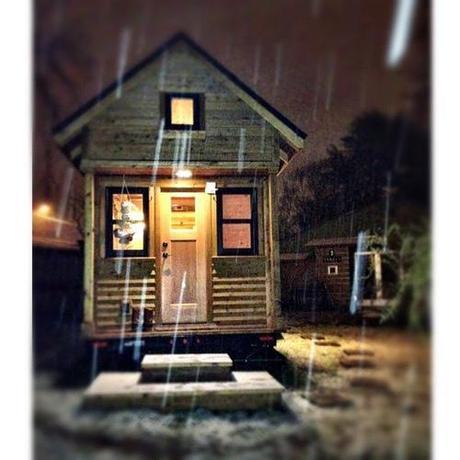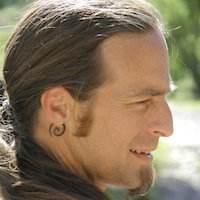
Tiny houses and natural living are some of the regular topics Derek Markham writes about. Photo by Tammy Stobel.
Derek Markham of NaturalPapa.com writes about life as manypeople have not experienced. Living in tiny houses (of 100-400 square feet), natural remedies, and homeschooling.
This makes Derek a wonderful writer to follow if you are looking to find ways to simplify and find more meaning in your everyday life. His writings are also full of tips to be more environmentally conscious, practice good stewardship, and connect with your kids.
We had the chance to ask Derek about his radically different life and perspective, and he was very generous with his time in answering our questions.
Goedeker’s: A lot of the things you write about and practice fall under the term “alternative lifestyle.” How did you come to be a tree-hugging, unschooling, minimalist?
Derek Markham: It’s been a long, strange trip, for sure, and I don’t know if there’s a short answer,

When she was pregnant with our first child, she knew she wanted to have a home birth, a concept that was new to me, but which intuitively made sense to me as well. We did end up with a hospital birth with our first, due to medical complications during pregnancy, but have had three other home births since then, and each one of them was an incredible experience, for us and for our relationship with each other.
When our oldest was still very young, we, like most parents, started teaching her through reading to her and explaining things to her, which was the start of our unschooling experience. She learned to read at age 4, and that opened up a whole world of learning for her, and so when it came time to consider putting her in school, we couldn’t imagine that putting her in a classroom with a group of kids, all learning at the same pace, would be in her best interest, so homeschooling was the obvious choice for us. Plus, when we looked at our own public school experiences, and the subjects we were taught and the way they were taught, we felt that we could give our children a more holistic education at home than by sending them to a classroom. Homeschool is in session every day, from morning until night, and everywhere we go is a chance to learn and to grow and to experience for our children, and we don’t feel obligated to fill their heads with any of the nonsense revisionist history or standard middle of the road political and philosophical ideas. Our oldest has now opted to go to a great local charter school for high school, and didn’t have any problems fitting in or being at the same educational level as the other kids, but our younger ones are still homeschooled. (And to clarify – we school them at home, but because we don’t follow a rigid homeschool curriculum, but instead let them lead the way by their own interests and use every experience as a teaching one, we consider this to be more in the vein of unschooling.)
At one point, we decided that in order to try to get ahead financially so that we could buy a piece of land and build our own home, we needed to get out from under the monthly rent obligation. So we purchased a used travel trailer and fixed it up a bit, then moved it onto some friends’ property and lived in it, almost rent-free, for about six years. It was quite a learning experience, and I wrote about it at Our Tiny House Experiment http://naturalpapa.com/alternative-lifestyle-experiment/our-tiny-house-experiment/
Goedeker’s: What challenges do you face raising your kids in a modern society that contrasts with the values you espouse?
Derek Markham: It’s been both easy and difficult, depending on the age of the kids and the specific situation, but one thing that has made a huge difference, other than homeschooling, is that we’ve never had a TV, so our kids have never had that daily influence from the mainstream media. Over the years, we have had a VCR to watch movies occasionally, and now use a laptop for that same purpose for the kids. We feel that they will have the rest of their lives to be inundated with all of those media messages, including gender stereotyping and the consumer-centric focus of most mass media, so we don’t see that they are missing out on anything now.
Since our oldest has been going to high school the last year and a half, it’s definitely been challenging as she and her peers are spreading their wings a bit and doing the typical ‘reject your parents’ values’ trip. But that’s also been a good lesson in letting go a little bit and letting our kids make their own choices, knowing that they’ve been raised in a good way and will always have that background.
Goedeker’s: What challenges do you think men face in integrating themselves more fully with their families and their environment?
Derek Markham: Wow, that’s a huge, potent question, and one that has been on my mind a lot over the last decade or so. There are so many mixed messages that we men pick up on as we grow up, either overtly or subtly, about our roles in relationships, in the family, in our work, and in the world, and when I look around at the current state of men and masculinity, it’s clear to me that there is a crisis. The rates of alcoholism and addiction in men, and anger and violence issues, are high, as are divorce rates and unhappy marriages, and those seem to me to be a symptom of this crisis in masculinity. So much of our self-worth gets put onto how much money we make, or how macho or dominant we can act, or we get caught up into overly identifying ourselves with our jobs, or we put too much emphasis on the providing instead of the nurturing.
Having said that, there are a lot of good men out there, and I’m fortunate to know some. However, those men have typically looked good and hard at their own personal development and worked on making their relationships with their wife and family, their friends, and their community, richer and more fulfilling. I don’t think it comes easy to many of us, as it requires admitting that we don’t know it all, and that we have a lot to learn, which is an uncomfortable place to be.
One big challenge is in being able to be vulnerable and open and honest – authentic – with our partners and our families, which can have far-reaching effects on how we relate to the world at large, including our role in the natural environment and how our actions affect it, both now and in the long run.
Another challenge is taking responsibility for our actions, beyond just what we do in our own homes (although that is a big first step) and going all the way out to the other side of the world, where billions of people don’t have access to the simplest basic needs, such as a toilet or clean drinking water or food for their families. It takes a lot of guts to see that we’re all in this together, and that we do have a responsibility for our fellow human beings, especially those that have so little, and then make choices in our daily lives that support those values and responsibilities. We only have this one planet, and as fathers, we need to understand that the legacy we leave for our children ought to be the most sustainable one possible, so their children and their children’s children (down to seven generations, as they say) have an abundant and prosperous future, not a dystopian future where resource scarcity and illness and pollution are the norms.
Another one is that we have to be able to come to grips with the fact that we may not ever get that sportscar or that gold watch or that fancy house on the beach or that supermodel wife, and that’s OK. We can have a healthy loving family and rich relationships with our wife and our friends and our community, and make a difference in the world through our humble householder path, and that can be fulfilling all on its own.
And yet another challenge lies in learning to create better friendships with our guy friends, and in cultivating supportive and honest and deep relationships with other men, outside of the bars and stadiums and workplace, and ones that can help us to grow into the best possible men we can be. Those friendships that are based solely on mutual and blind acceptance of our weaknesses, instead of those that call us on our BS and hold us accountable for our own actions, are easy to have, and yet can ultimately just drag us down and keep us from reaching our true potential as men, as husbands, as fathers, and as stewards of the Earth.
Goedeker’s: You’ve had a lot of jobs in your life so far. What is your favorite?
Derek Markham: I honestly love what I do now, which is to write and consult for and interact with all sorts of interesting and inspiring people, and try to do my part in making the world a better place, one word at a time. I do also enjoy my country lifestyle, with a huge garden and a young fruit tree orchard, lots of room to roam with the dog and the kids, and plenty of critters to keep us company (three cats, a dog, and a horse at the moment), and I hope to be able to transition into making at least a small amount of my income from our mini-farm in the future. I love to work outside, with my hands in the soil and the sun on my head and the wind in my ears, but so far, it’s just a hobby (and kind of like therapy for me, offsetting all of the hours I spend in front of a keyboard).
Goedeker’s: As a freelance writer, your essays and posts are in many different places. What is the best way for people to keep up on your latest?
Derek Markham: That’s tough, as I do publish at a number of places, but I can usually be found on Twitter (@derekmarkham), and my Google+ profile has links to everywhere I publish (or have published), and lately I’ve been using Rebel Mouse as an aggregator for most of my social activity.
You can find Derek’s main blog at NaturalPapa.com.

